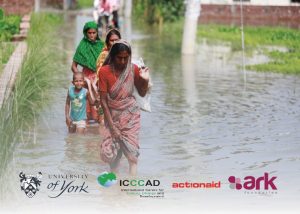
According to the 2022 population census, 31.5% of the population in Bangladesh lives in urban areas and majority of this urban population is concentrated in some of the primary cities of the country (such as Dhaka and Chittagong), while secondary cities (such as Khulna and Rajshahi) are growing rapidly. Dhaka is one of the fastest growing mega cities in the world and is now estimated to house more than 23 million people with 23,234 people per square kilometer (World population review, 2023). Despite the economic opportunities offered in the city, 34% of the city’s population is living below the poverty line (ibid) and mostly reside in slums and underserved areas. Dhaka is also one of the most vulnerable cities globally to climate change (Maplecroft Climate Change Vulnerability Index, 2013). Every day more than 2000 people migrate to the city (MMC, 2021). More than half of this population are cli mate migrants (i.e. migrated due to environmental hardship), and the number is growing (The Third Pole, 2023). Hence the (fast) urbanization processes in Dhaka are further exacerbated by climate change. Local governments are struggling to keep pace with this rapid urbanization and the result is unplanned development and overstretched health, transport, housing, water, garbage and sanitation infrastructure.


